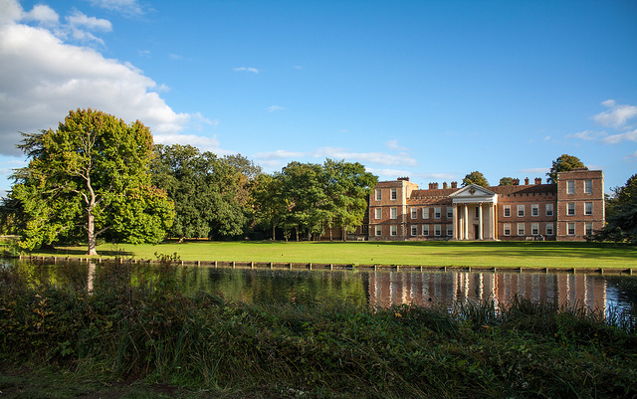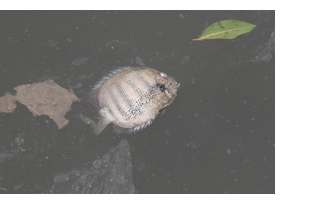Background
Park House is a country house set in 200 hectares of the finest English countryside. The house can be traced back 300 years, and has been extensively refurbished whilst staying in tune with its environment. Most of the land has now been sold off for farming and rural development.
The house is owned by a company, who have redeveloped Park House into a management-training centre, with bedrooms, catering and training facilities for 40 students. For all day-to-day decisions there is a management committee made up of representatives of several of the small training companies that use it.

PKS Training Limited uses the house and grounds as a base for their operations. The company runs residential courses (about 3 per month) at Park House.
Of particular interest are the splendid gardens, which contain a selection of magnificent mature shrubs set amongst well-tended lawns leading down to a lake. The lake is stocked with very rare freshwater fish and plants, and both the lake and its banks have been declared a nature reserve.
Over the last few weeks, however, several fish have been seen floating on the surface of the lake. Some of the water plants are also showing signs of distress.
As a member of the management committee Mike Watson from PKS Training has called in the local environmentalist retained as a consultant by Park House.
 The environmentalist, Herb Erriott, has established that the lake is suffering from biological contamination (from raw sewage), and that action must be taken promptly to discover and deal with the cause of the contamination. He stated that if the situation were not rectified within two weeks the entire lake would be dead.
The environmentalist, Herb Erriott, has established that the lake is suffering from biological contamination (from raw sewage), and that action must be taken promptly to discover and deal with the cause of the contamination. He stated that if the situation were not rectified within two weeks the entire lake would be dead.
The Wildlife Trust (a local environmental pressure group) have heard about the problem, and want to know what Park House is going to do to safeguard this important and valuable local natural amenity.
The Trust is prepared to go to court if necessary, to stop all use of Park House until the problem is solved. They are waiting to see how the leaking pipe will be repaired and the environment restored.
A brief examination of the plans for the site show that the main drain from the house runs under the lake on its way out to the main sewer in the road.
Mike Watson’s next job is to call in the local drainage experts, a well-respected engineering company called Bodgitt and Duck.
This firm carried out an extensive survey, and have discovered the following:
- The pipe down to the lake from the house and training centre is fine.
- The pipe from its exit from under the lake down to the main road is fine.
- There is a leak under the lake (identified by means of a dye test down the pipe).
Mike Watson asked Bodgitt and Duck (B&D) to investigate possible ways of fixing the pipe, and their conclusions were:
-
A trial of inserting a liner through the pipe failed because of the way that the pipe is damaged. This also explains why the lake is not draining out of the pipe, but sewage is leaking into the lake. It also explains how the damage was sustained. Two weeks ago one of the other training companies ran a management training event that involved the construction of rafts in the lake. Somewhere during this event the pipe suffered damage.
-
Installing a completely new pipe around the lake was rejected by the Wildlife Trust, as this would cause extensive damage to the banks of the lake, which are important nesting areas and refuges for some rare mammals, reptiles and birds.
-
A better long-term solution would be to replace the broken section of pipe. Technically this would be simple, even though B&D rule out building temporary dams around the leaking pipe (too risky – may cause even more damage to the pipe).
-
B&D state that it would be easy to drain the entire lake (this is not a big lake), replace the pipe, and refill the lake with clean water from a nearby spring.
Mike Watson then asked Herb Erriott if this could be feasible from an environmental point of view, and Herb is sure that this method of approach is sensible. He says that the fish can be caught and stored in a large tank for several days without problems. The slightly more difficult factor concerns the plants. These are very rare aquatic plants and their roots should not be exposed to the air.
Herb says that if we cover the plants during the draining of the lake (whilst the level of water in the lake is reducing), then they will survive for 48 hours. B&D confirm that the technical work in replacing the broken section of pipe will take no more than six hours, so it seems that we have a solution.
There is one huge business constraint hanging over this repair job. Park House is fully booked for a variety of events for the next six weeks. All of the companies that use Park House are small to medium sized companies, who charge premium rates for managers to attend courses. If the facility has to close for the work to be carried out then more than one of these small companies will lose revenue, possibly to the point of financial difficulties.
There is one possibility. All of the courses are finished by 14:00 on Friday afternoon, and Park House remains empty over every weekend. Delegates begin to arrive at 09:00 on Monday morning, so the job could be carried out over a weekend. Many of the courses end in examinations, so there cannot be any noise before 14:00 (for example the running of pumps to drain the lake will be too noisy), but certainly the site and the project team could be prepared ready for a start at 14:00.
Mike Watson has been asked by the other training companies to act a single point of contact for the project (the sponsor) and has been given a budget for the project.
Jenny Harris, a trainer working for PKS Training Ltd., has been asked to manage this project to a successful conclusion. Jenny has no great experience of project management but realises that she needs to take a structured approach to ensure a successful outcome.
Thanks to Mike Watson of Obsideo for providing this book





